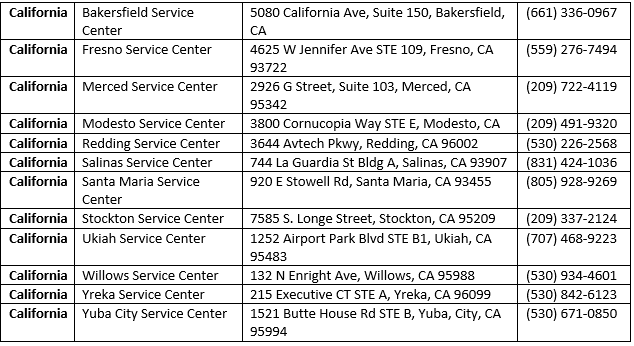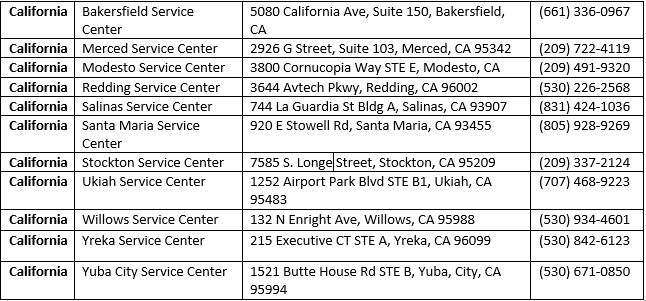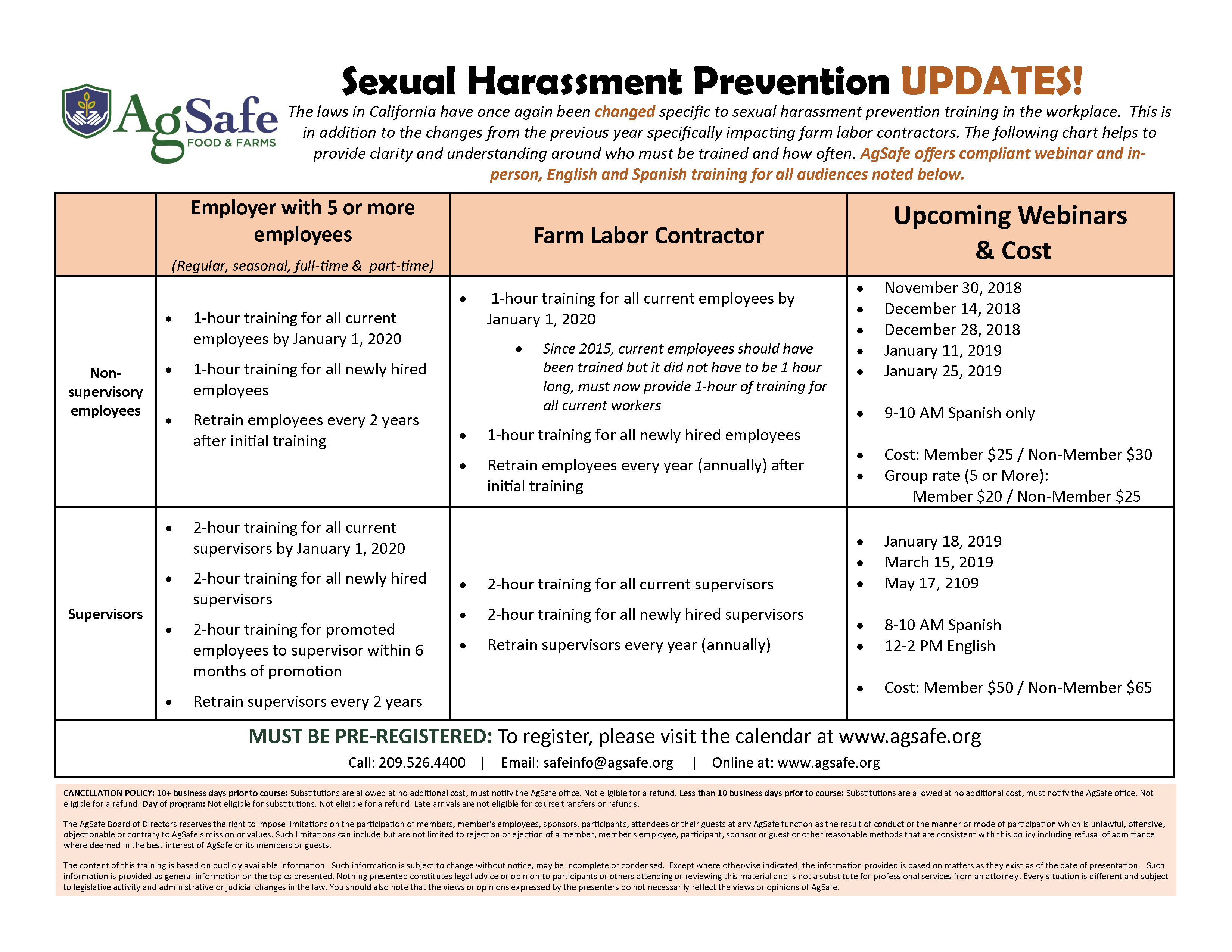The California Cotton Ginners and Growers Association is pleased to announce the election results from this year’s election. Up for election this year were four (4) Ginner Directors and (4) Grower Directors. The four Ginner Directors ran opposed and were re-elected, and included John Colbert, Modern Ginning; Stan Creelman, of Mid Valley Cotton Growers; Adriane Carbonel, of Farmers Cooperative Gin Inc.; and Matt Toste, of Westside Farmers Coop, Huron Ginning Company and Pacific Ginning Company LLC. There were five (5) candidates up for the four (4) Grower Director positions, which necessitated an election in Kern County. Winning re-election were Jim Neufeld and Bryan Bone in Kern County, and Cannon Michael in Merced County. Newly elected to the board is Tony Neves from Merced County. All terms are for three (3) years. Stepping down from the board this year was Robert McDonald from Merced County. McDonald has served on the Board since 2007, and the Association is extremely grateful for his dedicated service to the board in representing cotton growers in Merced County.
NEWS & ISSUES
California Energy Commission Kicks Off Renewable Energy Agriculture Program
The California Energy Commission is inviting small, medium and large farms to a special Grant Funding Opportunity (GFO) for the Renewable Energy for Agriculture Program (REAP). REAP grants range from $25,000 to $350,000 and support renewable energy upgrades for agricultural operations such as:
- Installation of Solar photovoltaic (PV) systems, wind turbines, and biomass-to-energy generation
- Replacement of diesel powered irrigation pumps and equipment with electric pumps
- Electric tractors and equipment charging infrastructure for use in the agricultural operation
Applications accepted until March 5, 2019. Watch a video to learn more : https://youtu.be/uvKtQ2vpVKQ and please plan to attend one of the 3 upcoming workshops with Energy Commission Staff to learn how to apply and ask questions! You can attend in person or remotely via web-ex.
Pre-Application Workshops dates, times and locations:
January 24, 2019, 1:00 P.M.
California Energy Commission
Sacramento, CA
January 28, 2019, 1:00 P.M.
San Joaquin Valley Air Pollution Control District
Fresno, CA
January 30, 2019, 2:00 P.M.
Imperial Valley Vegetable Growers Association
Imperial Valley, CA
For more information go to https://www.energy.ca.gov/renewables/reap/ or contact RoseMary Avalos in the Public Adviser’s Office for further questions at 916.654.4489 or publicadviser@energy.ca.gov.
UPDATE USDA Farm Service Agency Limited County Office Hours January 17th, 18th, & 22nd
U.S. Secretary of Agriculture Sonny Perdue today announced that many Farm Service Agency (FSA) offices will reopen temporarily in the coming days to perform certain limited services for farmers and ranchers. [CLICK HERE to read official press release.] The following California FSA Offices will be open for Farm Loan Program Service only January 17th, 18th, and 22nd from 8am-4:30pm.
Farm Loan Program services available include Processing Payments made on or before Dec. 31, 2018, Continuing Expiring Financing Statements, and Responding to General Loan Inquires. Producers are encouraged to call their nearest FSA Farm Loan Program Service Center listed above with any questions.
Farm Program services, such as MFP, will not be administered at this time. However due to the extension previously granted on MFP, I’d encourage your producers to email their applications to their FSA county directors whose contact can be found here. MFP applications will be processed as soon as normal operations resume upon conclusion of the shutdown. Producers who already applied for MFP and certified their 2018 production by December 28, 2018 should have already received their payments.
In California, USDA County Service Centers NRCS offices are open daily. Any NRCS inquires or business, producers can call or visit their county NRCS service center.
USDA Farm Service Agency Limited County Office Hours January 17th, 18th, & 22nd
U.S. Secretary of Agriculture Sonny Perdue today announced that many Farm Service Agency (FSA) offices will reopen temporarily in the coming days to perform certain limited services for farmers and ranchers. [CLICK HERE to read official press release.] The following California FSA Offices will be open for Farm Loan Program Service only January 17th, 18th, and 22nd from 8am-4:30pm.
Farm Loan Program services available include Processing Payments made on or before Dec. 31, 2018, Continuing Expiring Financing Statements, and Responding to General Loan Inquires. Producers are encouraged to call their nearest FSA Farm Loan Program Service Center listed above with any questions.
Farm Program services, such as MFP, will not be administered at this time. However due to the extension previously granted on MFP, I’d encourage your producers to email their applications to their FSA county directors whose contact can be found here. MFP applications will be processed as soon as normal operations resume upon conclusion of the shutdown. Producers who already applied for MFP and certified their 2018 production by December 28, 2018 should have already received their payments.
In California, USDA County Service Centers NRCS offices are open daily. Any NRCS inquires or business, producers can call or visit their county NRCS service center.
If you have any questions, please contact Aubrey Bettencourst at USDA- Farm Service agency at Aubrey.Bettencourt@CA.USDA.GOV or 530.792.5540.
Reminder: Last Day to Vote in Kern County Grower Election Friday January 18th
Friday January 18th is the last day to vote in the CCGGA Kern County Grower Election. There are two seats open on the Association’s Board of Directors. If you wish to vote, please mail your completed ballots to our offices at 1785 N. Fine Ave. Fresno, CA 93727. We thank you for your participation in this important process.
Market Facilitation Program Deadline Approaching
Attention Cotton Growers: USDA California Farm Service Agency has the Market Facilitation Program that provides payments to cotton producers who have been significantly impacted by actions of foreign governments resulting in the loss of traditional exports.
- Growers Must sign up by January 15
- 2018 production not required at sign up
- 2018 production must be submitted by May 1, 2019
- Visit www.farmers.gov/mfp for more information
- To Sign up please contact your local FSA Office
USDA launched the trade mitigation package aimed at assisting farmers suffering from damage due to unjustified trade retaliation by foreign nations. Cotton Producers are eligible to sign up for the Program. MFP provides payments to cotton producers who have been significantly impacted by actions of foreign governments resulting in the loss of traditional exports.
The sign-up period for MFP runs through Jan. 15, 2019, with information and instructions provided at www.farmers.gov/mfp. A payment will be issued on 50 percent of the producer’s total production, multiplied by the MFP rate for a specific commodity. A second payment period, if warranted, will be determined by the USDA.
For a list of initial MFP payments rates, view the MFP Fact Sheet.
MFP applications are available online at www.farmers.gov/mfp. Applications can be completed at a local FSA office or submitted electronically either by scanning, emailing, or faxing. To locate or contact your local FSA office, visit www.farmers.gov.
New Employment Laws that will Affect Employers
By: Jeanne Rosenberg
Governor Jerry Brown has signed all the legislative bills for 2018, his last as Governor of California, clearing the way for newly elected Governor Gavin Newsom to take his place next year. We now provide you with a compilation of employment related laws effective January 1, 2019, except when otherwise indicated.
AB 1066: Phase In of Overtime for Farmworkers
AB 1066, which went into effect in 2017, phases in new overtime requirements for agricultural employers, the first of which begins as the clock strikes midnight at the New Year. Starting in 2019, AB 1066 lowers the 10-hour-day threshold for overtime to 9.5 hours in a day and 55 hours per week when overtime pay is required. This only applies to employers with 26 or more employees.
Not only does this affect overtime wages, but also causes an adverse effect to employees on the minimum amount of paid sick leave employers are required to offer. Under California’s paid sick leave law, employees should be given the greater of either 24 hours or three days of PSL, regardless of whether the frontloading or accrual method is selected. This means that employees whose regular work day are 9.5 hours would get a minimum of 28.5 hours of paid sick leave per year.
For more information regarding this bill and its gradual phase-in to the standard 8 hour day/40 hour workweek model, see our previous post here.
SB 1300: Expanded Fair Employment and Housing Act
As we previously reported here, employers will be prohibited, with certain
exceptions, from requiring an employee to sign a release of claims under the Fair Employment and Housing Act in exchange for a raise or bonus, or as a condition of employment or continued employment. Employers are also prohibited from requiring an employee to sign a non-disclosure agreement that aims to deny the employee the right to disclosure of unlawful acts in the workplace, including sexual harassment.
SB 820: Settlement Disclosure of Sexual Harassment Claims
Settlement agreements entered into will prohibit and make void any provision that prevents the disclosure of factual information related to civil or administrative complaints of sexual harassment, sexual assault, workplace harassment, or discrimination based on sex. As previously reported here, this bill does not prevent parties from mutually agreeing to settle, but it will prohibit individuals and/or businesses from requiring a claimant to remain silent about the alleged assault/harassment as a condition of settlement. Further, SB 820 expressly authorizes provisions that (1) preclude the disclosure of the amount paid in settlement of a claim and (2) protect the claimant’s identity and any fact that could reveal the identity, so long as the claimant has requested such anonymity and the opposing party is not a government agency or public official.
AB 3109: Disclosure of Sexual Harassment
AB 3109 makes a provision in a contract or settlement agreement void and unenforceable if it waives a party’s right to testify in any proceeding concerning alleged criminal conduct or sexual harassment. In many settlement/severance agreements, it is not uncommon to include a provision that a former employee will not participate in any actions against the employer or will not make any disparaging remarks against the employer. Now, any provision that does not allow an employee to testify when they are required by subpoena or requested in writing by an administrative agency or legislature will be void. This bill was previously reported here.
SB 1343: Expanded Duties for Employers Regarding Sexual Harassment Training
SB 1343 requires an employer of five or more employees to provide sexual harassment training within 6 months of assuming their position and once every two years thereafter. By January 1, 2020, all supervisors must receive at least two hours of training, and all nonsupervisory employees must receive at least one hour. For more information regarding this bill, see our previous post here.
AB 1976: Accommodation for Lactation
This bill requires employers to make reasonable efforts to provide workers with a use of a room or private area that is not a restroom to pump breast milk. Existing law required that employers only make a reasonable effort to provide both a lactation space that is not a bathroom stall. If an employer can demonstrate that providing a separate room (other than a bathroom) would create an undue hardship, an employer shall make reasonable efforts to provide an employee with the use of a room or other location, other than a toilet stall, in close proximity to the employee’s work area, for the employee to express milk in private. For more information regarding this bill, see our previous post here.
AB 1654: Expanded Exemption of PAGA Claims for Union Construction Employers
This bill exempts employers in the construction industry from claims under the Private Attorneys General Act of 2004 (“PAGA”) if the employees are covered under a valid collective bargaining agreement (“CBA”) in effect any time before January 1, 2025 that expressly provides for the wages, hours of work, and working conditions of employees. As previously posted here, this applies to any CBA in currently in effect until the CBA expires or January 1, 2028, whichever is earlier.
SB 1252: Right to Receive a Copy of Employment Records
Labor Code section 226 is amended to provide employees the right to receive a copy of their employment records. If requested by the employee, the employer must provide copies to the employee rather than require the employee copy the records on their own.
SB 224: Sexual Harassment Relationships Expanded to Venture Capital Industry
Civil Code section 51.9 is amended to expand the definition of sexual harassment under the Unruh Act, a California civil rights law that prohibits discrimination based on things like sex, race, religion, age and disability. The Unruh Act, in its previous form, prohibited sexual harassment between people who have a business relationship but don’t work for the same company and the plaintiff was not able to easily terminate the business relationship. Now, under SB 224, a plaintiff has a viable claim for sexual harassment if they prove, among other things, that the defendant holds himself or herself out as being able to help the plaintiff establish a business, service, or professional relationship with the defendant or a 3rd party. In addition, the amendment eliminates the element that the plaintiff prove there is an inability by the plaintiff to easily terminate the relationship.
Furthermore, to drive the point home, the statute has been amended to specifically include lobbyists, elected officials, directors, producers, and investors as examples of persons that can be subject to a claim for sexual harassment.
SB 1412: New Limits on Criminal Background Checks
Labor Code section 432.7 is amended to limit the exception for both public and private employers that are required by law to screen applicants using a criminal background check. The new law only permits inquiries about an applicant’s criminal history to a “particular conviction” that is relevant to the position sought by the applicant. Particular convictions is defined as “conviction for specific criminal conduct or a category of criminal offenses prescribed by [law] that contains requirements [and/or] exclusions…expressly based on that specific criminal conduct or category of criminal offenses.” Inquiries into particular convictions are only permitted in the following situations:
- The employer is required by law to obtain information regarding the particular conviction of the applicant, regardless of whether that conviction has been expunged, judicially ordered sealed, statutorily eradicated, or judicially dismissed following probation;
- The employer requires the applicant to possess or use a firearm in the course of his or her employment;
- An individual with that particular conviction is prohibited by law from holding the position sought by the applicant, regardless of whether that conviction has been expunged, judicially ordered sealed, statutorily eradicated, or judicially dismissed following probation;
- The employer is prohibited by law from hiring an applicant who has that particular conviction, regardless of whether that conviction has been expunged, judicially ordered sealed, statutorily eradicated, or judicially dismissed following probation.
SB 826: Women on Corporate Boards
By close of 2019, SB 826 requires public companies whose principal executive offices are located in California to have at-least one female director on its board. By the close of 2021, must comply with the following standards:
- Four or fewer board members: minimum of 1 female director;
- 5 board members: 2 female directors;
- 6+ board members: minimum of 3 female board members.
For more information regarding this bill, see our previous post here.
SB 970: Human Trafficking
As previously posted here, by January 1, 2020 and every two years thereafter, hotels and motels must provide at least 20 minutes of training and education regarding human trafficking awareness to an employee who will likely interact or come into contact with victims of human trafficking, such as an employee who works in a reception area, performs housekeeping duties, help customers in moving their possessions, or drives customer.
COUNSEL TO MANAGEMENT:
There are a lot of new laws this year; please make sure to take the time to understand the implications of these laws and how they may affect your company. If you have any questions or concerns regarding the new bills or how to comply with their requirements, please do not hesitate to contact the experts at the Saqui Law Group.
AgSafe Sexual Harassment Prevention Updates
AgSafe is offering compliant webinars for all the new Sexual Harassment Prevention regulations in both English and Spanish. You must pre-register for the trainings by visiting the calendar at www.agsafe.org. See the attached flyer below for more information.
Cal/OSHA Electronic Reporting
Cal/OSHA’s Emergency Regulations for Workplace Injuries require employers to electronically submit their 2017 Form 300A on the OSHA ITA Launch Website by December 31, 2018 to comply. This regulation is in compliance with federal OSHA requirements. Please visit the OSHA ITA Launch Website, for instructions https://www.osha.gov/injuryreporting/index.html. Should you need assistance, please contact Elda Brueggemann for step-by-step instructions. 
Air District Announces Opening of the FARMER Ag Truck Replacement Program
The San Joaquin Valley Air Pollution Control District (Air District) is pleased to announce the formal opening of the FARMER Ag Truck Replacement Program funding opportunity. Earlier this year, the California Air Resources Board (CARB) announced that funding opportunities would be made available through the Funding Agricultural Replacement Measures for Emission Reductions (FARMER) program. Funding will be provided at 65% of the cost of the eligible replacement truck. Target vehicles for this program include vehicles that utilize the following Truck and Bus Regulation compliance options:
- Agricultural Vehicle Extension
- Low-Use Exemption
- Specialty Agricultural Vehicle Extension
- Model Year Schedule and the truck must operate as an “agricultural vehicle” as defined in the Truck and Bus Regulation
In order to receive funding for the Heavy-Duty Truck portion of the program, applicants must show compliance with the Truck and Bus Regulation for this current year. Funding will be on a first come, first serve basis, so we recommend you get your applications in ASAP. Applications can be found on the Air District’s website at http://valleyair.org/grants/FARMER.htm. Any questions in regards to the program can be directed to the incentives department representatives Jennifer Schmaill, Kashmir Pandher, Kira Taylor or Ryan Delmanowski with the Air District at (559)-230-6000.



